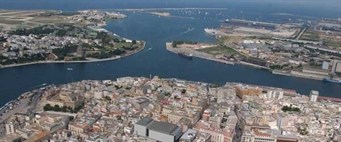Brindisi
 Of ancient origins, Brindisi was founded by the Messapian people, who colonized part of current day Apulia from the eighth century B.C. After the Roman conquest, the city became critically important, thanks to its port, as a path to the conquest of the Balkans and Greece and as a hub for trade with the Eastern Mediterranean. Directly connected to Rome by the Via Appia from the second century B.C, Brindisi was the scene of many significant events in Roman history, such as the siege by Julius Caesar during the Civil War or the reconciliation between Octavian and Mark Anthony. With the fall of the Roman Empire began a long period of decline. In the Middle Ages, the recovery of the city was once again linked to its port. From Brindisi in fact pilgrims and crusaders headed to the Holy Land, and among them there was also the Emperor Frederick II, who nurtured a real fondness for Brindisi. In the Early Modern period the city sank into a serious economic and demographic crisis, a true reflection of the loss of importance of its port. In 1656 the population was also decimated by a terrible epidemic of the plague.
Of ancient origins, Brindisi was founded by the Messapian people, who colonized part of current day Apulia from the eighth century B.C. After the Roman conquest, the city became critically important, thanks to its port, as a path to the conquest of the Balkans and Greece and as a hub for trade with the Eastern Mediterranean. Directly connected to Rome by the Via Appia from the second century B.C, Brindisi was the scene of many significant events in Roman history, such as the siege by Julius Caesar during the Civil War or the reconciliation between Octavian and Mark Anthony. With the fall of the Roman Empire began a long period of decline. In the Middle Ages, the recovery of the city was once again linked to its port. From Brindisi in fact pilgrims and crusaders headed to the Holy Land, and among them there was also the Emperor Frederick II, who nurtured a real fondness for Brindisi. In the Early Modern period the city sank into a serious economic and demographic crisis, a true reflection of the loss of importance of its port. In 1656 the population was also decimated by a terrible epidemic of the plague.
